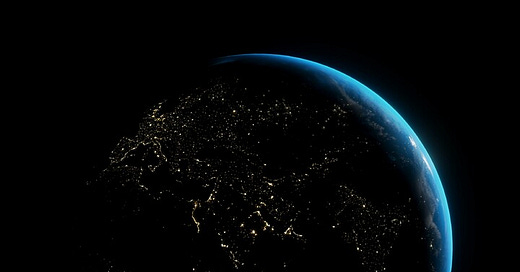An integrated world - feeling connected through grateful living
Each summer we select audience favourites from The Gist archives to share with all of you. This year we are doing a throwback to our early days with a series on the senses and their impact on our collective well-being. Not just our five physical senses but also our awareness which allows us to develop better habits of mind, feel more compassion for others and practice grateful living. Given the degree of upheaval and hyper-partisanship around the world there is no better time to revisit how we can think about and respond more critically to everything going on within and around us. Whether you've been with us from the beginning or are new to The Gist, we hope you enjoy this summer selection.
This week we examine how grateful living provides us with that much needed sense of integration. One of my favourite authors, Benedictine monk and scholar David Steindl-Rast, has made gratefulness his life's work. Having read and listened to so many different authors, there is something about Brother David that really stands out for me. Perhaps it is his simple but eloquent words, the warmth and humility he exudes, or the depth of his wisdom. Whatever it may be, I find his ideas on gratitude nourishing and very accessible to all of us, no matter our age, race, or culture.
Brother David believes that gratitude goes beyond thankfulness for our worldly possessions or feeling happy when life is easy. He sees gratefulness as an orientation towards life that we carry with us through all its ups and downs. That is why he prefers the term grateful living because he sees it as a stance we take, a choice we make. He points out that grateful living doesn't mean that we can be grateful for everything in our lives or in the broader world. Certainly when life presents us with difficult circumstances, or when someone hurts us, it is not possible to be grateful. Nor is it possible to feel gratitude for all the pain, suffering and injustice we see in the world. But he proposes that it is possible to feel grateful in each moment for the opportunity that moment presents.
Even in the midst of personal difficulty or the darkest periods of our shared human history, he invites us to look for the opportunity to learn something, to be instruments of change, to be an oasis for others and support them where we can. Brother David proposes that this kind of gratitude grounds us deep within ourselves and allows us to connect more easily with others because we become less angry, less fearful and more open to learning and helping. And as he would say "It is not happiness that makes us grateful, but gratefulness that makes us happy."
Brother David also speaks a lot about fear, which he distinguishes from anxiety. He suggests that anxiety is inevitable in life as we have new experiences, navigate the unknown and deal with difficulties. But fear, he says, is optional. While anxiety can come and go as a response to something happening in our lives, fear can cripple us into inaction. He gives the example of birth, where each of us come through the birth canal, a tight and uncomfortable space, into a totally unfamiliar and overwhelming world. But the only way we survive is to trust the process, to keep moving through the experience, anxiety and all. If in that moment fear paralyzed us we would never be born nor go on to experience the fulness of our lives.
Steindl-Rast also believes that fear is what stops us from feeling more connected to others. He believes our competitive, hierarchical structures may have been useful over the course of human history, but are not serving us as well any more. He thinks the world must move more towards a network approach to human interaction. This concept is at the core of the community he has established, called The Grateful Living Network. Using the power of the internet, Brother David and others working with him, have connected millions of people around the world through this simple, secular practice of grateful living. The more we can see our human commonalities and our fundamental equality, rather than our differences the more we can relate to each other harmoniously and work towards an integrated world. One in which we cannot go on treating others as adversaries, use violence to solve problems, or keep consuming resources as if they were limitless.
Throughout his life, Brother David has reached well beyond his Christian roots and started interfaith dialogues with those practicing other religions such as Buddhism. He has found common ground with others across faith groups through a shared sense of gratefulness. And he hopes to bring more wisdom, mutual respect and civilized dialogue into the world through his teachings on grateful living. Along with a sense that we each belong to the human race so we must, as Brother David would put it, say a shared yes to belonging.
If you want to learn more about Brother David and his work, you can go to https://gratefulness.org/ or read his books including Gratefulness, the Heart of Prayer. You can also try one of his many videos on YouTube including his TedTalk



